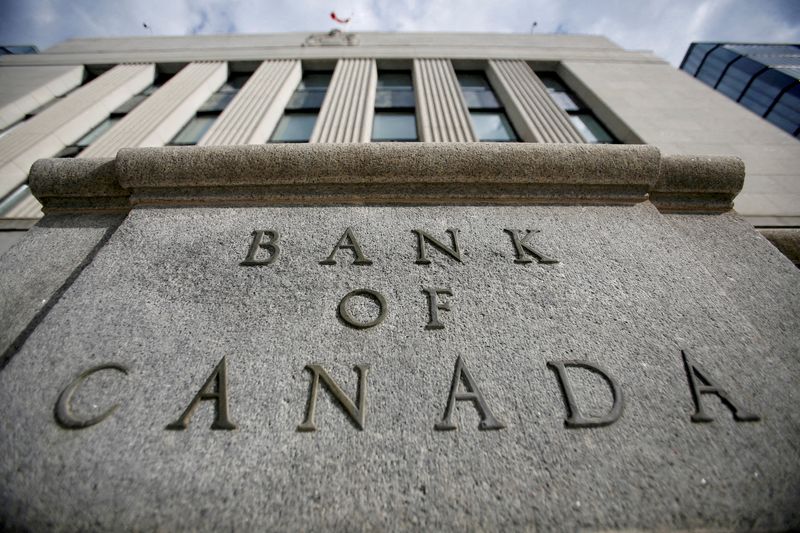By Steve Scherer and David Ljunggren
OTTAWA (Reuters) -The Bank of Canada on Wednesday raised interest rates by half a percentage point - its biggest single move in more than two decades - and promised more hikes to fight soaring inflation that is being driven in part by the war in Ukraine.
The central bank raised its benchmark overnight rate to 1% from 0.5%. It also said it would allow government bonds it amassed during the COVID-19 pandemic to roll off as they mature from April 25, beginning what is known as quantitative tightening.
Both moves were in line with analyst expectations. The Bank of Canada last hiked by 50 basis points (bps) in May 2000. In remarks made after the announcement, Governor Tiff Macklem said more rate increases would be needed.
"We are committed to using our policy interest rate to return inflation to target and will do so forcefully if needed," Macklem said. The Bank said there was "an increasing risk" that inflation expectations "could become entrenched."
The Canadian dollar was trading 0.4% higher at 1.2595 to the greenback, or 79.40 U.S. cents, recovering from its weakest level in nearly four weeks earlier in the session.
"Given the mountainous task at hand in terms of addressing inflation... some very aggressive actions were warranted," said Doug Porter, chief economist at BMO Capital Markets. "It certainly looks like there's a solid possibility that (the Bank) follow this up with another 50-basis-point increase in June."
Macklem noted that despite Wednesday's hike, rates were still far below the neutral rate, which the bank calculates at somewhere between 2% and 3%.
"If demand responds quickly to higher rates and inflationary pressures moderate, it may be appropriate to pause our tightening," Macklem said. "On the other hand, we may need to take rates modestly above neutral for a period to bring demand and supply back into balance and inflation back to target."
The Reserve Bank of New Zealand also hiked rates by 50 bps to 1.50% on Wednesday, and the U.S. Federal Reserve is expected to deliver two back-to-back half-point interest rate increases in May and June as central banks seek to tackle inflation.
On Wednesday, the Bank of Canada lifted its inflation forecast for the first half of the year to just below 6% compared to the 5% predicted in January.
It also raised the forecast for 2022 to 5.3% from 4.2%, blaming Russia's invasion of Ukraine for adding to global commodity prices, energy costs and supply chain disruptions.
Inflation hit a 30-year high of 5.7% in February, its 11th consecutive month above the Bank of Canada's 1-3% range. The Bank last month hiked rates for the first time in three years, increasing them to 0.5% from a record low 0.25%.
On Wednesday it also updated the growth outlook, saying the economy would grow at a scorching 6% annualized rate in the second quarter, double the pace of the first, driven by consumer spending.

"A broad set of measures suggests that economic slack has been absorbed and that the economy is starting to operate beyond its productive capacity," the April Monetary Policy Report said.
The next interest rate announcement will be on June 1.